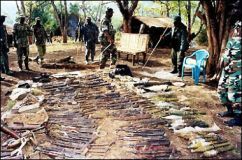Uganda fears Garang’s death may prolong brutal war with LRA rebels
KAMPALA, Aug 2 (AFP) — As Sudan ponders the future of its landmark north-south peace deal in the wake of the weekend death of ex-rebel leader John Garang, neighboring Uganda voiced fears Tuesday that his demise may prolong its own long-running war with the Lord’s Resistance Army (LRA).

|
|
Ugandan army soldiers display weapons captured from the Lords Resistance Army (LRA) in Kipwayi hills, some 50 miles inside Sudan near the border with Uganda on April 7, 2005. (AFP) . |
To many here, Garang was not only a powerful symbol of southern Sudanese aspirations but also a potent counterbalance to the notoriously brutal LRA, which operates in northern Uganda and has numerous bases over the border in south Sudan.
“To me, this is a blow to our peace process,” northern Ugandan lawmaker Reagan Okumu said of Garang’s death on Saturday when the Ugandan helicopter in which he was returning to Sudan crashed in poor weather.
“Garang had personal attachment with the people in northern Uganda and it was hoped that if he took firm control over southern Sudan, this LRA menace will cease,” he told AFP.
In fact, Garang’s last public comments, made here before his ill-fated flight, were a vow to flush the LRA and its elusive leader Joseph Kony out of southern Sudan from where they have launched savage raids into northern Uganda for 19 years.
“Joseph Kony won’t be hiding there for long,” the 60-year-old leader of the Sudan People’s Liberation Movement/Army and newly appointed first vice president of Sudan told Uganda’s state-run New Vision newspaper on Friday.
“We need to provide peace, security and stability,” he said ahead of talks on security in the region with Ugandan President Yoweri Museveni, in whose helicopter he would perish 24 hours later.
Such remarks endeared him to the Ugandan military and the civilian population of rural northern Uganda which has been systematically terrorized by the LRA’s mass killings, rapes, mutilations and abductions of children for nearly a generation.
“He was committed to joining hands with us to stop this rural terrorism,” said Ugandan army spokesman Shaban Bantariza. “But all this is lost now, we only hope that others will continue from where he ended.”
While acknowleging an impact on the LRA rebellion, which has claimed the lives of tens of thousands and displaced more than 1.6 million people, Bantariza insisted Garang’s death would not make it easier for the guerrillas to fight.
“The unfortunate incident in Sudan does not favor them at all,” he told AFP.
Others are not so certain, however, noting reports that LRA fighters had been heard rejoicing and celebrating at the news of Garang’s death in intercepted radio transmissions from northern Uganda and southern Sudan.
“Some pressure on them is erased by the death of Garang for some time,” said an analyst for an internationally respected think tank who requested anonymity due to the sensitivity of his work in the region.
“A peace process is multi-faceted,” the analyst said. “The SPLA and Garang in this case were part of the dynamics that were shaping it in Uganda.”
Of most concern to him and to church and community leaders in northern Uganda most affected by the LRA’s reign of terror is the potential for Garang’s death to derail the January 9 north-south Sudan peace deal.
They said the pact that ended Africa’s longest-running civil war is critical to restoring stability in southern Sudan and, in the process, dealing with LRA who have camped there for years with the backing of the Sudanese government.
Damage to the Sudan agreement from Garang’s absence could have “dire consequences” for attempts to resolve the conflict in northern Uganda, the analyst said, a sentiment echoed in the region.
“If his death disrupts peace in southern Sudan, this may affect us negatively,” said Father Carlos Rodriguez, a Catholic priest in Gulu district which has been the epicenter of the LRA war.
“A peaceful southern Sudan is a guarantee for peace for us in northern Uganda,” he told AFP by phone from Gulu town.
